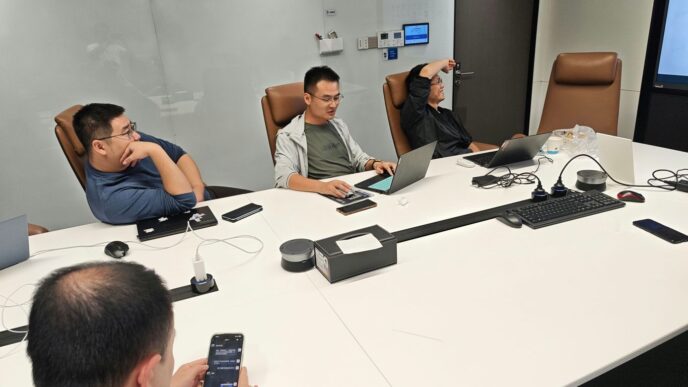It feels like every day there’s something new in the world of search engines and online marketing. Keeping up can be a real challenge, right? This article pulls together some of the latest thoughts and advice from Search Engine Journal to help you get a handle on what’s happening. We’re looking at how things are changing, especially with AI popping up everywhere, and what you can actually do to make sure your website or business gets seen. Think of this as a quick rundown of the important stuff so you don’t get left behind.
Key Takeaways
- SEO is still very much alive, but the focus is shifting away from just churning out content towards creating genuinely useful and trustworthy material for people.
- AI is changing how we do SEO. It’s less about how much content you create and more about the quality and how well it works with AI systems.
- New ways of getting found are appearing, especially with AI-powered search and the rise of zero-click searches. You need to adapt your strategies to fit these changes.
- Using platforms like Reddit can be a smart move for boosting your SEO, showing that diverse approaches still matter.
- Understanding user behavior through data is more important than ever to make sure your content and search strategies actually connect with what people are looking for.
Navigating The Evolving Search Landscape
The way people find information online is changing, and fast. It feels like every week there’s a new update or a shift in how search engines work. Keeping up can feel like trying to hit a moving target, but it’s super important if you want your website to be seen. We’re seeing big changes with AI, and that’s shaking things up for SEO pros.
Building SEO Strategies That Withstand Algorithm Turbulence
Search engine algorithms are always getting tweaked. It’s not just about keywords anymore. Google and others are trying to figure out what users really want and give them the best answer. This means your strategy needs to be flexible. Instead of just focusing on one thing, think about the bigger picture. What are users actually looking for? How can you provide the most helpful and complete answer?
- Focus on user intent: Understand why someone is searching for a term, not just what they’re typing.
- Create high-quality content: This is still king. Make sure your content is accurate, well-written, and covers the topic thoroughly.
- Build authority: Get links from reputable sites and make sure your site is seen as a trustworthy source.
- Stay updated: Keep an eye on official announcements and industry news to see what’s changing.
Understanding The New Rules For Zero-Click Search Visibility
More and more, search results are giving people answers directly on the search page. This means fewer people are clicking through to websites. It’s called zero-click search. So, how do you get noticed when people aren’t even leaving the search results page? It’s about getting your information featured in those special spots, like featured snippets or answer boxes. This often means providing clear, concise answers to common questions.
The End Of The Web As We Know It?
Some people are saying AI is going to completely change the internet. With AI chatbots and new ways of getting information, the traditional website might not be as important. It’s a bit dramatic, but there’s truth to it. We need to think about how our content can be understood and used by AI. This doesn’t mean the web is dead, but it does mean we need to adapt. The goal is to be helpful and visible, no matter how people are searching.
AI’s Impact On Search Engine Optimization
It feels like AI is everywhere these days, and search is no exception. We’re seeing big changes, and honestly, it’s a bit of a wild ride trying to keep up. The way people find information is shifting, and AI is right at the center of it all. This isn’t just about new tools; it’s about a whole new way search engines are working.
AI Content Quality Versus Quantity For Ranking Success
So, does throwing more AI-generated content at the wall make it stick? Not really. Search engines are getting smarter, and they can spot low-effort, repetitive content from a mile away. The real trick is making AI content that’s actually useful and well-written. Think about it: if you’re looking for an answer, do you want a wall of text that sounds like a robot wrote it, or something clear and helpful? Quality is definitely winning over sheer volume. It’s about making sure the AI-assisted content provides real value to the person searching.
Balancing AI Efficiency With Human Quality For SEO Wins
This is where things get interesting. AI can speed things up, sure. It can help brainstorm ideas, draft outlines, and even write sections of text. But it often lacks that human touch, that nuanced understanding, or that unique perspective that makes content truly shine. The best approach seems to be a partnership. Use AI to handle the heavy lifting, the repetitive tasks, and the initial drafts. Then, bring in human editors and writers to refine, fact-check, add personality, and ensure everything aligns with your brand voice and audience needs. It’s about using AI as a tool, not a replacement.
Common Mistakes To Avoid When Investing In AI Search
Jumping into AI search without a plan is a recipe for disaster. A lot of people are making the same few mistakes, and it’s costing them.
- Not defining clear goals: What do you actually want AI to do for your SEO? Just saying "use AI" isn’t a strategy.
- Ignoring technical foundations: If your website is a mess technically, AI won’t magically fix it. You need a solid technical SEO base.
- Over-reliance on automation: Thinking AI can do everything without human oversight is a big misstep.
- Not tracking results properly: If you don’t know what’s working, how can you improve?
AI Visibility Index: What Data Reveals About AI Search Platforms
We’re starting to see data emerge that shows how different AI search platforms are performing and how visible content is on them. It’s still early days, but keeping an eye on these trends is important. Understanding which platforms are gaining traction and what kind of content they favor will help shape future strategies. It’s a dynamic space, and the data will continue to evolve as AI search becomes more integrated into our daily lives.
Content Strategies For The Modern Search Era
It feels like every other day there’s a new way search engines want us to do things, right? It’s enough to make your head spin. But honestly, it all comes down to one thing: making stuff that people actually want to read or watch. Forget just stuffing keywords; we need to think about what our audience is looking for and give it to them in a way that feels natural and helpful. This means really digging into what makes your audience tick.
Creating Audience-First Content That Earns Trust
This is the big one. If you’re not putting your audience first, you’re already behind. Think about it: when you search for something, you want answers, not a sales pitch. So, how do we actually do this?
- Know your people: What are their problems? What questions do they ask? What are they curious about? Use tools, surveys, and even just talk to your customers. Get a real feel for their world.
- Answer the question, fully: Don’t just give a surface-level answer. Provide depth, context, and practical advice. If someone asks "how to fix a leaky faucet," give them step-by-step instructions, maybe even a video link if that makes sense. The goal is to be the best answer out there.
- Be real: Use a natural voice. Avoid sounding like a robot trying to sell something. Share your own experiences, even the messy ones. People connect with authenticity.
- Make it easy to find: Structure your content well. Use headings, bullet points, and short paragraphs. If people can’t find what they need quickly, they’ll leave. This is where good on-page SEO still matters, even with all the AI changes.
The Skyscraper Technique’s Transformation In The AI Era
The skyscraper technique, where you find the best content on a topic and make something even better, isn’t dead. It’s just changed. Now, it’s not just about being longer or having more stats. It’s about being more comprehensive, more authoritative, and more useful, especially when AI is involved. AI can pull facts, but it struggles with nuanced opinions, unique perspectives, and genuine human experience. So, when you’re building your skyscraper:
- Add unique insights: What’s your company’s take on this? What data can you share that no one else has?
- Incorporate multimedia: Videos, infographics, interactive tools – these add layers that AI can’t easily replicate.
- Focus on E-E-A-T: Experience, Expertise, Authoritativeness, and Trustworthiness. Show, don’t just tell, why you’re qualified to talk about this. Include author bios, case studies, and testimonials.
- Structure for AI and humans: Make sure your content is well-organized so AI can understand it, but also easy for a person to scan and digest. This means using clear headings and subheadings. Thinking about how to craft clever prompts can help you structure your content for AI understanding.
Repurposing Content For New Organic Growth Opportunities
Don’t let good content sit around collecting dust. Repurposing is key to getting more mileage out of what you’ve already created. It’s not just about making a blog post into a social media update; there are deeper ways to do this.
- Blog post to webinar: Take a popular blog post and turn it into a live or recorded webinar. This allows for deeper dives and Q&A.
- Data report to infographic: If you have a report with interesting stats, visualize them in an infographic. This makes the data more shareable and digestible.
- Customer testimonials to case studies: Turn positive feedback into detailed case studies that show real-world results.
- Long-form article to short video series: Break down a lengthy guide into a series of short, engaging videos for platforms like TikTok or YouTube Shorts.
- Podcast episode to blog posts: Transcribe and edit podcast episodes into detailed blog posts, capturing keywords and audience questions.
By thinking creatively about how to reuse and reformat your existing content, you can reach new audiences and reinforce your message without starting from scratch every time. It’s a smart way to work.
Leveraging Platforms For SEO Growth

It’s not just about your own website anymore. To really get your SEO moving, you’ve got to think about where else people are looking for information. This means looking beyond Google and considering other platforms where your audience hangs out. Think about it: if your potential customers are active on Reddit, shouldn’t you be there too? Building a presence on these sites can actually send good signals back to search engines and bring in traffic.
Building An Organic Reddit Strategy That Drives SEO Impact
Reddit can be a goldmine for SEO if you approach it right. It’s not about spamming links; it’s about becoming a helpful member of a community. First, you need to find the right subreddits – places where your target audience discusses topics related to your business or industry. Don’t just jump in and start posting. Spend time understanding the community’s rules and culture. Then, start by offering genuine value. Answer questions, share insights, and participate in discussions. When it feels natural, you can link to your own content if it directly helps someone, but make sure it’s not the primary focus. Tracking engagement here is key; upvotes and comments can signal to search engines that your content is relevant and useful.
Google Search Console Rolls Out Custom Annotations
This is a big deal for anyone serious about SEO. Google Search Console just made it easier to track what’s happening with your site’s performance. They’ve rolled out custom annotations. What does this mean? It means you can now mark specific dates in your performance reports to note when you made changes to your website, launched a campaign, or experienced an external event. This helps you connect performance fluctuations directly to your actions or outside factors. It’s like having a diary for your SEO efforts, making it much simpler to see what worked and what didn’t.
Here’s a quick look at how you might use them:
- Algorithm Update: Mark the date of a known Google update to see its impact.
- Website Change: Note when you updated content, improved site speed, or launched a new section.
- Marketing Campaign: Record the start and end dates of any paid or organic campaigns.
- Competitor Activity: If a major competitor makes a big move, you can note it.
How AI Wins More Customers & Supercharges Your Business
AI isn’t just a buzzword; it’s changing how businesses connect with customers. For SEO, this means understanding how AI tools can help you find new audiences and serve existing ones better. AI can analyze vast amounts of data to identify trends and customer needs you might miss. It can help personalize content and ad experiences, making them more relevant to individual users. This personalized approach often leads to higher conversion rates and stronger customer loyalty. Think about using AI to predict what your customers will search for next or to automate parts of your customer service, freeing up your team to focus on more complex issues. It’s about working smarter, not just harder, to grow your customer base.
Key SEO Truths And Data Insights

5 SEO Truths That Cut Through The AI Noise
Look, AI is changing things, no doubt about it. But some core ideas about SEO are still super important. It’s easy to get lost in all the new tools and buzzwords, but focusing on what actually works is key. The goal is still to help users find what they need, and AI is just another way search engines are trying to do that.
Here are a few things that seem to hold true, even with all the AI stuff happening:
- Content Quality Matters Most: Forget just churning out tons of AI-generated text. Search engines, and especially users, can tell the difference between helpful, well-written content and something that’s just… there. Focus on creating content that answers questions thoroughly and provides real value.
- User Experience is Non-Negotiable: How easy is it for someone to use your site? Can they find what they’re looking for quickly? Things like site speed, mobile-friendliness, and clear navigation are still big deals. AI can’t fix a bad user experience.
- Links Still Signal Authority: While the way links are used might evolve, getting links from reputable sites still tells search engines that your content is trustworthy and important.
- Understanding Your Audience is Paramount: Who are you trying to reach? What are their problems? The better you know your audience, the better you can create content and a site experience that meets their needs. AI can help analyze data, but it doesn’t replace genuine audience insight.
- Adaptability is Key: The search landscape is always shifting. What worked last year might not work as well today. Staying informed and being willing to adjust your strategies is more important than ever.
17 Data Reports That Every SEO Should Be Tracking
Keeping an eye on the right data helps you see what’s working and what’s not. It’s not just about guessing; it’s about using numbers to guide your decisions. Here’s a list of reports that can give you a good picture of your SEO performance:
- Overall Organic Traffic Trends: How much traffic are you getting from search engines over time?
- Keyword Rankings: Where do your important keywords show up in search results?
- Click-Through Rate (CTR) by Page/Keyword: How many people actually click on your link when it appears?
- Bounce Rate: Are people leaving your site immediately after landing on a page?
- Average Session Duration: How long do people stay on your site?
- Pages Per Session: How many pages do users visit during a single session?
- Conversion Rates (Organic Traffic): How many visitors from search engines complete a desired action (e.g., purchase, sign-up)?
- Top Performing Pages (Organic): Which pages bring in the most organic traffic and engagement?
- Top Landing Pages (Organic): Where do users first arrive on your site from search?
- Exit Pages: Which pages are users leaving your site from?
- Crawl Errors (Google Search Console): Are there technical issues preventing search engines from accessing your site?
- Mobile Usability Issues (Google Search Console): Is your site working well on mobile devices?
- Backlink Profile Growth: Are you gaining new links, and are they from good sources?
- Competitor Rankings & Traffic: How do you stack up against others in your space?
- AI Search Visibility Index: Tracking how your brand performs across emerging AI search platforms.
- User Behavior Flow: How do users move through your site?
- Core Web Vitals: How is your site’s performance, loading speed, and interactivity?
The Behavioral Data You Need To Improve User Search Journeys
Understanding how people actually behave when they search and interact with your site is super important. It’s not just about getting them to click; it’s about what happens next. This behavioral data helps you fine-tune the entire experience.
- Search Intent Analysis: Go beyond keywords. What is the user really trying to achieve with their search? Are they looking for information, trying to buy something, or comparing options? Matching your content to this intent is critical.
- On-Page Engagement Metrics: Look at scroll depth (how far down a page users go), time spent on page, and interaction with elements like videos or forms. This tells you if your content is holding attention.
- Navigation Paths: How do users move from one page to another? Are they finding what they expect? Identifying common paths can reveal opportunities for better internal linking or site structure.
- Form Abandonment Rates: If users start filling out a form but don’t finish, why? Is it too long, confusing, or are there technical glitches? This is direct feedback on your conversion process.
- Clickstream Data: This tracks the sequence of pages a user visits. It can highlight popular content clusters, user journeys, and potential drop-off points in the funnel.
The Future Of Search Engine Journal Insights
Expert Advice and Predictions for 2026
Alright, so we’re looking ahead to 2026, and things are definitely shifting in the search world. It’s not just about keywords anymore, not by a long shot. AI is really changing the game, and honestly, it’s kind of exciting. We’ve seen a lot of experimentation, some good, some… well, not so good. But the dust is starting to settle, and it looks like the core principles of good SEO are still super important. Focusing on quality content that actually helps people is what’s going to win out. It’s less about tricking algorithms and more about building trust with your audience.
What Real, Experience-Driven SEO Looks Like
So, what does this mean for us day-to-day? It means we need to think about the whole user journey. It’s not just about getting a click anymore. It’s about providing real answers and experiences. Think about it: AI is getting really good at summarizing information, but it still needs solid sources. That’s where we come in. We need to create content that’s not just informative but also authoritative and trustworthy. This involves:
- Deeply understanding what your audience is actually looking for.
- Creating content that goes beyond surface-level answers and provides genuine value.
- Making sure your content is easily understood and cited by AI systems.
It’s about being the best resource out there, period. If you can do that, you’ll be in a good spot, no matter how search engines evolve.
Opportunities to Seize in the Year Ahead
Looking forward, there are some big opportunities. For starters, AI search platforms are still pretty new, and there’s a lot we don’t know. This means there’s room to experiment and find what works. We’re seeing data that shows a lot of AI-generated links get zero clicks, which is pretty wild. This tells us that while AI can surface information, it doesn’t necessarily drive traffic in the way traditional search results do. So, focusing on:
- Building strong organic strategies: Don’t abandon traditional SEO. It’s still the backbone.
- Creating unique, experience-based content: What can you offer that an AI can’t just scrape and summarize?
- Monitoring AI visibility: Understand how your content appears in AI-generated answers and zero-click results.
It’s a bit of a balancing act, for sure. We need to embrace the new AI tools and understand how they work, but we can’t forget the fundamentals of creating great content for real people. The future is about integrating AI into our strategies, not letting it replace them entirely.
Wrapping It Up
So, what does all this mean for us trying to get noticed online? It looks like the core ideas of SEO and marketing are still super important. Even with all the new AI stuff popping up, making good content that people actually want to read and use is still the main goal. We saw that AI can help, but it’s not a magic fix. Focusing on what your audience needs and building trust seems to be the way forward. It’s a lot to keep up with, for sure, but by staying aware of these shifts and focusing on quality, we can keep our strategies working.
Frequently Asked Questions
Is SEO still important with all the new AI tools?
Yes, SEO is definitely still important! While AI tools are changing things, they actually make good SEO even more valuable. Instead of just making lots of content, the focus is now on creating high-quality content that people really like and trust. AI helps make things faster, but human creativity and understanding what people need are still key to getting noticed online.
How does AI affect how websites rank in search results?
AI is changing how search engines work. Instead of just looking at keywords, search engines are using AI to understand content better and figure out what users truly want. This means that creating helpful, trustworthy content for people is more important than ever. AI tools can help create content, but it needs to be good quality and provide real value to rank well.
What is ‘zero-click search’ and how can I get noticed?
Zero-click search happens when people find the answer to their question right on the search results page, without needing to click on a website. To get noticed, your content needs to be clear, concise, and provide direct answers. Using features like featured snippets and structured data can help your information appear directly on the search results page.
Should I use AI to create all my website content?
It’s best to find a balance. AI can help you create content faster and brainstorm ideas. However, relying only on AI can lead to content that feels generic or doesn’t quite hit the mark. Mixing AI efficiency with human review and creativity ensures your content is accurate, engaging, and truly connects with your audience.
What’s the ‘Skyscraper Technique’ and how has AI changed it?
The Skyscraper Technique is a way to improve your content by finding popular articles on a topic, making your own content even better and more detailed, and then getting other websites to link to it. With AI, it’s still useful, but now you also need to make sure your super-powered content is unique and offers a perspective AI alone can’t provide, making it truly stand out.
Where can I find reliable information about SEO and marketing trends?
Websites like Search Engine Journal are great sources for the latest news and advice on SEO and marketing. They often publish trend reports, expert insights, and practical guides. Following reputable industry blogs and subscribing to newsletters can help you stay updated on changes and best practices.














